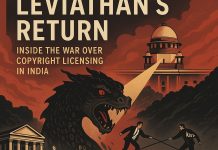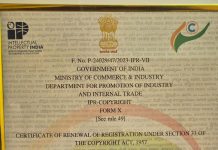The Copyright Office issued a public notice on January 24, 2018 notifying that the Registrar of Copyright has issued an interim license under Section 31D(1) of the Copyright Act, 1957 in favour of M/s Kuku & Koyal Internet now known as M/S Kuku & Koyal Internet Pvt .Ltd. The public notice can be read here.
The Public notice calls upon any person or organisation having any stake to contact the Copyright Office.
The public notice mentions that the licensee has submitted the list of following companies as music providers whose music they have used or intend to use:
i) Phonographic Performance Limited (PPL)
ii) T Series (Super Cassette Industries Limited) Mumbai
iii) Shree Venkatesh Films
iv) Eros International Media Limited
v) Yash Raj Films
vi) Zee Music, Mumbai
vii) Rajshri Productions, Mumbai
viii) Khanna Music, Ludhiana
ix) SIMCA- South India Music Company, Chennai
x) Big Music, Mumbai
xi) Bro Bite Music Company, Kerala
xii) Shemaroo, Mumbai
xiii) Malwa Records, Bhatinda,
xiv) White Hill Production, Punjab
The public notice mentions that the list is suggestive only.
The interim order has been passed by the Registrar of Copyright Office in compliance of an order dated March 14, 2017 passed by Hon’ble Punjab & Haryana High Court, Chandigarh in the matter of Inderjit Singh & Anr v/s Ramesh Abhishek & Anr [COCP No. 622/ 2017 (O&M). Read order here.
In the matter of Inderjit Singh & Anr v/s Union of India & ors [CWP- 21945/2016], the Punjab & Haryana High Court had vide order dated October 21, 2016 directed the Registrar of Copyright office (Respondent 3) that if the petitioners approach the Registrar by moving an appropriate representation under Section 31D of Copyright Act, 1957 within a period of four weeks, the Registrar shall consider and decide the same at an early date by passing an appropriate order within a period of three months from the date of representation from the petitions. The Court further directed that if the petitioners would make a request for any interim relief, the Registrar shall consider the same and pass an appropriate order in accordance with law. Read order here.
Since the order of the Punjab and Haryana High Court was not complied with by the Registrar of Copyright, a contempt petition was filed by Inderjit Singh pursuant to which the aforesaid order dated March 14, 2017 was passed by the Court wherein the court called upon the respondents to comply with the October 21, 2016 order within four weeks.
As per the records published by the Copyright Office, the interim statutory license [read here] under Section 31D of the Copyright Act, 1957 was granted by Mr. Jagdish Swaroop, Deputy Registrar of Copyright to M/s. Kuku and Koyal Internet, Ludhiana on April 10, 2017 towards an interim relief for conducting the business of internet broadcasting for communicating such work as desired by the licensee recorded in sound recordings in the repertoire to the public by internet broadcasting on revenue sharing basis subject to terms and conditions as per the order of the Copyright Board under Section 31(1)(b) of the pre amended Copyright Act, 1957 dated August 25, 2010. [Read Copyright Board order here].
It is surprising that the interim license issued by the Deputy Registrar of Copyright requires the licensee to pay royalties in accordance with the Copyright Board order of 2010 for internet broadcasting. The Copyright Board had vide its order dated August 25, 2010 required PPL to grant compulsory licenses under 31(1) (b) of the Copyright Act, 1957 to the complainants (radio broadcasters) for communicating the work recorded in sound recordings in the repertoire, present and future, of the respondent (PPL) to the public by broadcast on revenue sharing basis wherein the radio broadcasters were required to pay 2% of net advertisement earnings of each FM radio station accruing from the radio business only for that radio station for pro rata distribution of compensation to all music providers including PPL in proportion to the music provided by the respective music providers and broadcast by the complainant (Radio broadcasters). The Copyright Board order was challenged before several courts by various music labels and the matter is still sub-judice.
Section 31D was introduced by the 2012 Amendment to the Copyright Act under which a provision has been made for the grant of statutory license for broadcasting of literary and musical works and sound recordings, subject to payment at such rate that may be fixed by the Copyright Board. It provides that any broadcasting organisation desirous of communicating to the public by way of a broadcast or by way of performance of a literary or musical work and sound recording which has already been published may do so by giving a prior notice of its intention to the copyright owner and the Registrar of Copyright and by paying such amount of royalties at the rate fixed by the Copyright Board (in accordance with the procedure laid down in S.31 D and Rules 29-31 of the Copyright Rules, 2013). The broadcasting organization shall give prior notice to the right holders, pay royalty as fixed by the Copyright Board in advance.
The DIPP had issued an office memorandum on September 5, 2016 [read here] clarifying that the words “any broadcasting organization desirous of communicating to the public” in Section 31 D may not be restrictively interpreted to cover only radio and TV broadcasting. The Office Memorandum stated that on a joint reading of the definitions of “Broadcast ” and “Communication to the public” under the Act, the term broadcast shall include all kinds of broadcast including internet broadcast.
Section 31 D thus came as a boon to the radio and internet broadcasting industry. However, the constitutionality of Section 31D is already a subject matter of challenge before the Calcutta High Court in the matter of Eskay Video Pvt. Ltd vs Union of India (WP. 14979(W)/2016).
In all likelihood, the interim license granted by the Registrar of Copyright to Kuku & Koyal Internet Pvt. Ltd would be challenged by the music labels/ sound recording owners. In my view, the 2010 Copyright Board order should not have been kept as the base for revenue sharing for internet broadcasting as the internet and radio sectors are two completely different sectors and should not have the same revenue sharing arrangement as the stakes are different. There is an urgent need for the Copyright Board (now IPAB) to set up a new commercially viable royalty sharing mechanism for internet and radio broadcasting taking into account the present revenues earned by these sectors .
Hat tip for copyright office public notice: Kinat Sisodia



















[…] A week after the Delhi High Court stayed the interim license granted by the Copyright Office in favour of Kuku & Koyal Internet Private Limited in petitions filed by Saregama India Limited and Super Cassettes India Private Limited [ Read my post here], Zee Music has obtained a similar order from Delhi High Court. [Read order here]. Details of the interim license granted by the Copyright Office in favour of Kuku & Koyal Internet Pvt. Ltd can be read in my post here. […]
[…] of the section has been frequently challenged – both before the Supreme Court as well as various High Courts. The challenge is based on the argument that Section 31D privileges the rights of […]